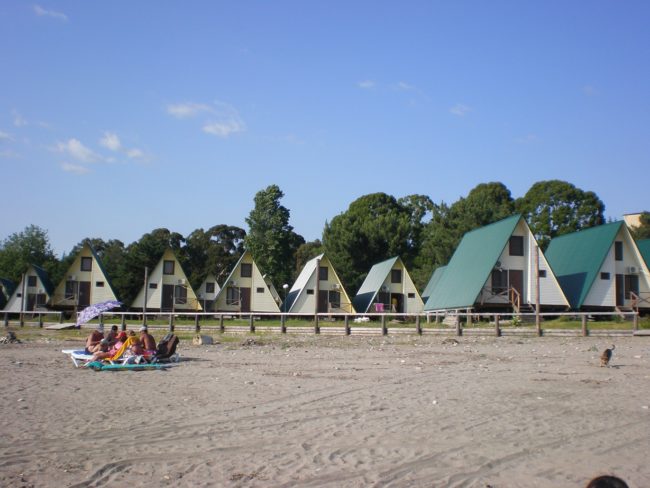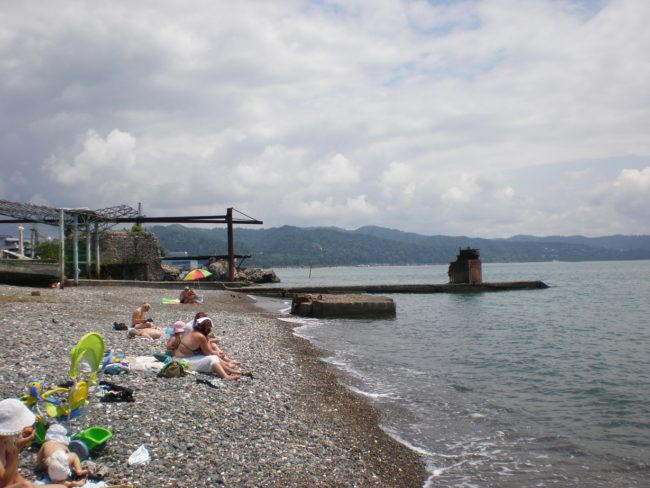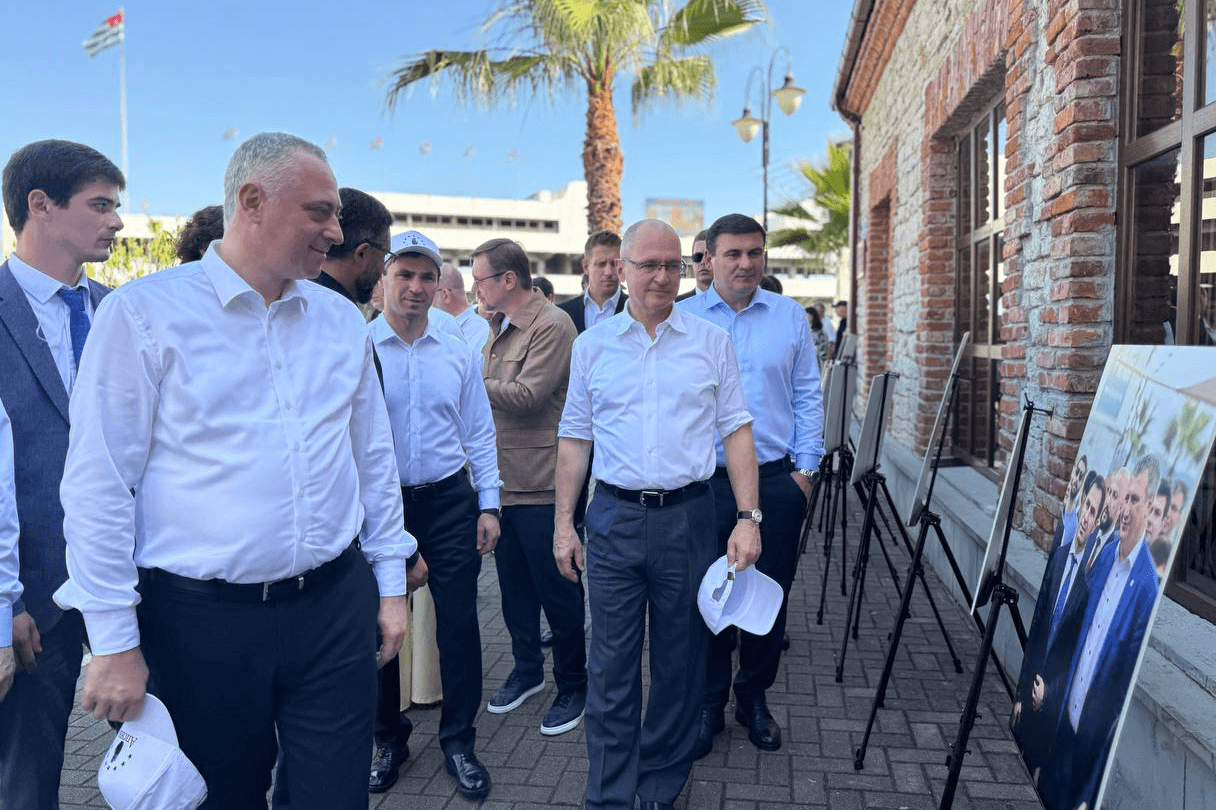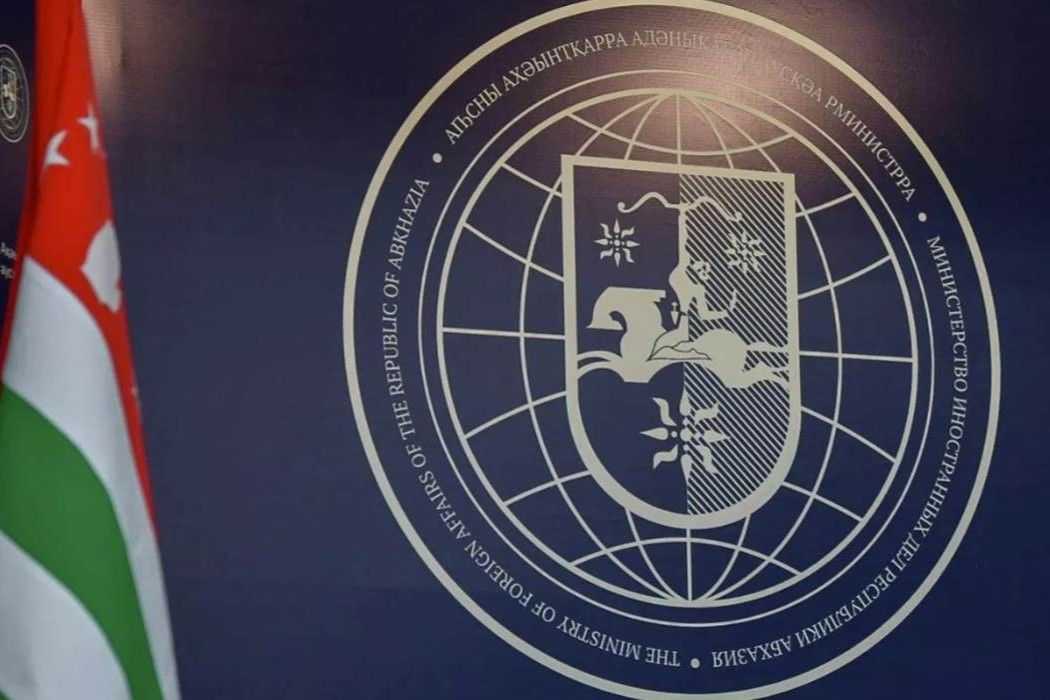

 Many in Abkhazia have lamented the failure of this year’s tourist season, connecting it directly to rising levels of crime. The usual problems were compounded by high profile attacks on tourists and an explosion at an ammunition depot which left two tourists dead.
Many in Abkhazia have lamented the failure of this year’s tourist season, connecting it directly to rising levels of crime. The usual problems were compounded by high profile attacks on tourists and an explosion at an ammunition depot which left two tourists dead.
‘The government can’t cope with crime’
Zhanna Bganba has been renting out her holiday house to tourists for seven years. She says this year the season fell through because the government has failed to cope with crime.
‘We are all very upset that this year the tourist season was spoiled. Other people in the tourism sector say the same. Year after year we’ve lived on this money, but this year 60% of our customers simply refused to come, as there was constantly news about someone getting robbed or killed’, Zhanna tells OC Media.
According to her, even those who came felt uncomfortable with what was happening during their stay.
A series of events hit the tourist season hard this year. The murder of a Russian tourist, high-profile robberies and attacks on tourists, and on top of it all, the explosion at a Russian military ammunition dump which left many tourists dead and wounded. All this has negatively affected Abkhazia’s image as a tourist destination.
‘Every summer I managed to save money to survive the rest of the year. This year I will have to get a job because I earned nothing this season. If I were a tourist, I would prefer to go to Turkey, where for the same money I will get better service and safety. And their food prices are lower than in our country’, Zhanna says.
A tourism bonanza
The previous two years broke all records for the local hospitality sector.
According to the Russian Federal State Statistics Service, more than 4 million Russians visited Abkhazia in 2016, making it the most popular foreign destination for Russians. Russian tourists are attracted to Abkhazia’s warm sea and the absence of a visa regime — it’s possible to visit with only an internal Russian passport.
While Russia’s statistical service counts everyone who crosses the border, the Abkhazian Ministry of Tourism counts only those who stay in hotels and guesthouses. The authorities in Sukhum estimate last year’s influx of tourists to be 1.5 million, bringing in ₽2.6 billion ($44 million) — 8% of Abkhazia’s GDP.

‘The complete crash of the tourist season’
Gudisa Kadzhaya owns 14 cottages in the seaside town of Pitsunda. Two years ago, he took a loan to build eco-cottages in the forest.
‘For the first two years the business was going well, the cottages were full, people kept booking the rooms. But what happened this year was the complete crash of the tourist season. My cottages are 50% empty. Now we are in the high season, but there are still very few people here compared to last year’, Gudisa told OC Media in early September.
At only 28 years old, Gudisa had managed to build a truly profitable business, which used to bring in several million roubles (up to $100,000) each season. Thanks to this, he had managed to repay his loans to the bank. Now, however, he is selling all his cottages to pay off the rest of his debts.
‘It makes no sense to take another loan, so I decided to sell everything. The state doesn’t render any support to businessmen and especially doesn’t care about the image of the country. The only reason this season has failed is crime, which has surpassed all possible bounds. Tourists are being robbed and murdered — who would want to come here? No-one’, Gudisa says.
‘We patrolled the beaches ourselves’
Suren Arakelyan has to protect his guests in New Athos — in a literal sense. He rents out rooms in his house but because of the increase in thefts, he and his neighbours agreed they would try to catch the thieves themselves.
‘Tourists kept complaining that they had their belongings stolen on the beach, although we always warned them not to take money or expensive things to the beach. I got tired of all the tourists leaving because of the criminality and decided with my neighbours to patrol the beaches where our guests rested’, Suren says with anger.
He recalls how one day he caught a 15-year-old boy who had stolen a purse from a tourist.
‘It turned out he was from a dysfunctional family — that’s how he justified his actions. We didn’t hand him over to the police, they won’t fix him anyway. But we warned him that we were watching him, and if we catch him again, he will have to face the consequences’, Suran says.
According to him, everyone who rents out rooms hopes crime levels will improve by the next season.
‘I have ten rooms in my house and each of them brought me ₽1,000 ($17) a day. This year only four rooms were occupied. Now we are in the high season, but there are no tourists at all. The people who booked rooms have refused to come, explaining they were afraid something could happen to them. I still believe the police will join us in our efforts and improve next year’s season for us’, Suren says.
‘Next year will be better’
According to Anna Kalyagina, director of local travel agency Atsetuk Travel, this May visitor numbers were about 60–80% of the previous year’s.
‘In general, this season’s collapse was not predicted. The crisis also hit different sectors differently at different periods of time. While at some points guesthouses were 80–90% full and occupancy in hotels was at 30–60%, other times this was the reverse’, Anna explains.
She also believes the decline in tourism is directly connected to safety concerns.
‘Next year is likely to be a bit better if the situation with the safety of tourists improves and the weather stays good. We still should not delude ourselves because there will still be a significant decline compared to 2015 and 2016, maybe 15–20%’, Anna says.
According to her, it is also necessary to improve the quality of service tourists receive, as well as the facilities and infrastructure.
‘We should not lose our uniqueness and attractiveness. It’s necessary to preserve our culture and nature to attract tourists with eco-holidays and active kinds of tourism, everything that is related to our nature and culture. All of it should be supported by the state, and of course, by all state structures’, she says.
The Ministry of Internal Affairs of Abkhazia declined our request for comment on this story, referring us to their official crime statistics.
This article was prepared with support from the Friedrich-Ebert-Stiftung (FES) Regional Office in the South Caucasus. All opinions expressed, and terminology used are the words of the author alone, and may not necessarily reflect the views of FES or the OC Media editorial board.






